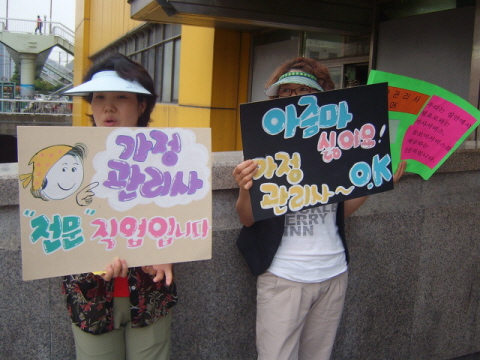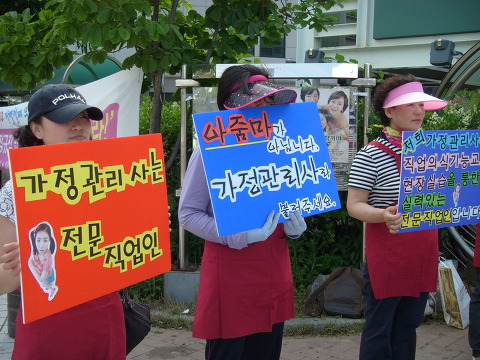“Please, address me as a house manager not auntie” - Simultaneous campaigns across the country for improving the social cognition of housekeeping service workers
HOT ISSUES & NOTICE 2010. 7. 29. 11:46
They are addressed as housekeepers, domestic helpers, or aunties.
They came out on the street.
“Please address me as a house manager not a housekeeper.”
“Auntie No, House Manager OK”
“A house manager is a professional woman.”
With pickets prepared carefully, they stood imposingly in front of people, even though they felt a bit shy.
They are housekeeping service workers taking care of housework and caring which were considered as unpaid work in the family. As a vacuum in housekeeping and caring at home has been made because of increasing economic activities of women, the rapid aging of our society, change of the family types, and so on, they fill up the vacuum. There are 160,000 housekeeping service workers as of 2007 according to the Economically Active Population Survey of the National Statistical Office. However, their actual number is probably much more than 160,000 if we consider the number of housekeeping and caring service workers in the informal sector which does not show up in statistics.
Even though there are a fair number of housekeeping and caring service workers, they are still considered as insignificant people doing housework in the society rather than professional workers. Such a social cognition is often reflected in dramas that they are addressed as housekeepers, domestic helpers, aunties, etc. or treated disrespectfully.
Therefore, the National Cooperative of House Managers (NCHM) which is an organization of housekeeping service workers directly concerned, has been conducting simultaneous campaigns across the country for improving the social cognition of housekeeping service workers from June 5 to July 7.
“We work hard with pride as we support economically active women or families who need housekeeping service and take care of clients’ well-being. However, a low social cognition (housekeeper, domestic helper, insignificant work, embarrassing work, etc.) of our service makes us feel uncomfortable and conceal our occupation. Nonetheless, housekeeping and caring service is already an essential profession in this society because of increasing economic activities of women, the problem of childcare and the aged, and so on. Folks, we are not mere housekeepers or aunties. We are professional house managers. We want to work proudly in the social environment respecting our occupation.” – Excerpt from the campaign of the NCHM Masan-Changwon Branch
Housekeeping workers across the country speak out loudly with one voice and say, “We are professional workers. We have completed the professional training and provide the systematic service of housekeeping and caring. Please address us as house managers not aunties.”
Introduction of the NCHM
The KWWA established the NCHM as a
community of professional house managers for expanding women’s jobs. In the
situation that most middle aged women had difficulty in getting jobs due to
labor market polarization and they were employed in the informal sector such as
housekeeping services, the KWWA judged the necessity to develop services of
middle aged women professionally for their financial independence and then
organized the NCHM as a nationwide organization in November 2004. Currently the
NCHM has about 700 members with 11 branches in Seoul, Busan, Incheon, Bucheon,
Ansan, Daegu, Gwangju, Jeonju, Masan-Changwon, Suwon, etc.

